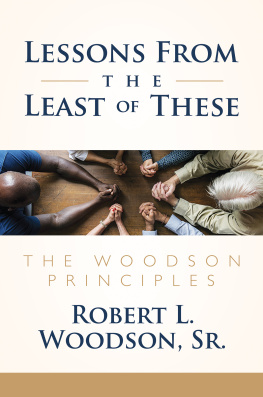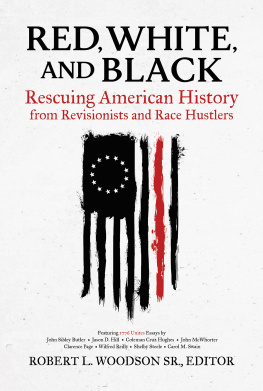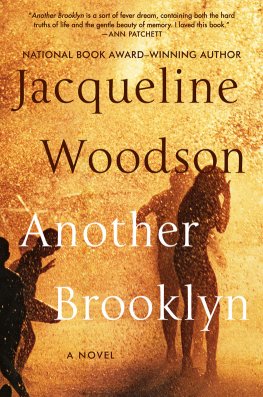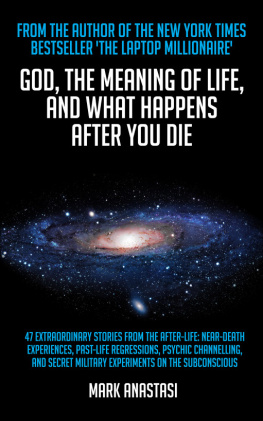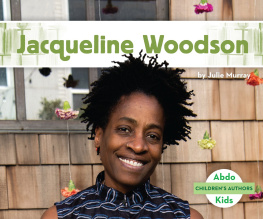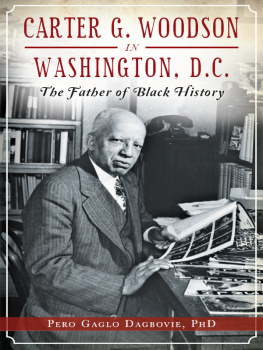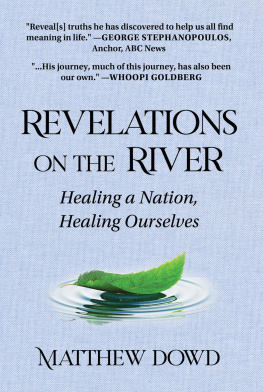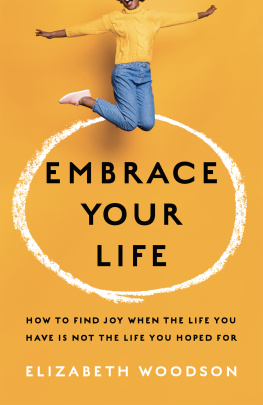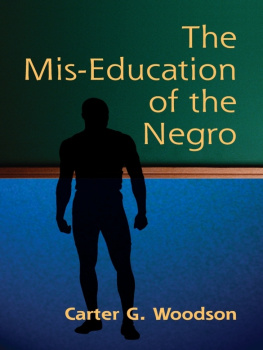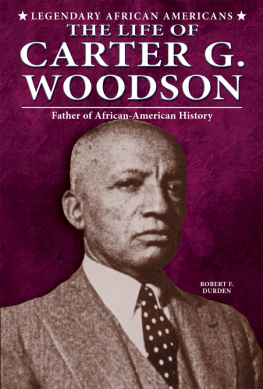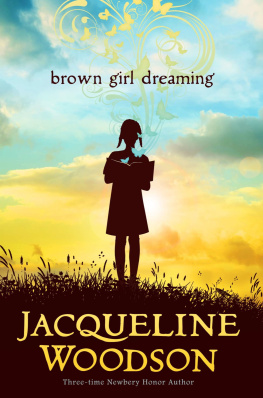Advance P raise for
Lessons From the Least of These
I was brought to the work of urban community development through the teachings and philosophies of Bob Woodson. Those familiar with Mr. Woodsons lifelong work know that his legacy is best reflected in those he personally touches and the countless others he will influence with his Woodson Principles. Within the urban gardens of America, people like Bob Woodson have planted a family tree that sprouts the leaves of shared knowledge, experiences, and relationships that foster a common bond between friends and stranger s alike.
Jamie Elder, Stan d Together
Bob Woodsons book debunks the utopian fantasies of people who presume to know what the poor need, using the wisdom and words of the poor themselves. I hope people listen to him, and more importantly, listen to the people who have been victimized for generations by terrible public policy.
Mark Levin, Author, Radio and TV B roadcaster
Bob is on the path to becoming an enjoyable Upton Sinclairthe Sinclair we always needed. He proves that with Lessons From the Least of These: The Woodson Principles. He exposes wrongdoing, humanely and without gotcha tactics. He gives voice to the voiceless. He tells their stories. Give it a readits ent hralling.
Glenn Beck, Radio Hall of Fame Inductee and Bestsell ing Author
Bob Woodson does not offer theory or speculation. He speaks from decades in the trenches, supporting self-help efforts to improve the quality of life for poor peopleworking from the bottom up, not the top down. The lessons are profound and inst ructive.
Bernard E. Anderson, Ph.D., The Wharton School, University of Pe nnsylvania
After covering Bob Woodsons award-winning work for more than thirty years, this is the book that I long have hoped he would write. In troubled communities where way too much bad news has happened, Woodson has helped local residents to come together, grow effective leaders, and turn the bad news good. Along the way, he also has learned valuable, thought-provoking life lessons like those he has gathered in this book. The result is a valuable gift that appeals across partisan or sectarian lines in the pragmatic, problem-solving spirit he expressed to me years ago: Its not whats right or left that counts, but what works.
Clarence Page, syndicated Chicago Tribune columnist, winner of the Pulitzer Prize for commenta ry in 1989
Bob Woodson is the one leader on the issue of poverty that every American should know. The insights in his book come from decades of experience with real people in real communities, and the rest of us couldnt do better than to listen to what he says.
Eric Metaxas, #1 New York Times bestselling author and host of the nationally syndicated Eric Metaxas Radio Show
Bob Woodsons Lessons from the Least of These offers a powerful remedy for the perennial problems plaguing black communities. Woodson is the man of the hour because he holds the key to liberating both white and black Americans from the failed policies and ideologies that have kept both groups in a vicious cycle of co-dependency. Woodson is a visionary with a plan for saving the most vulnerable in our communities. He is not a race leader. He is a man for our times. History will remember him as a man who stood up and cast a hopeful vision for black America at a time when everything seemed h opeless.
Dr. Carol M. Swain, author, public speaker, podcast host, and former professor at Vanderbilt and Princeton Un iversities

BOMBARDIER BOOKS
An Imprint of Post Hill Press
ISBN: 978-1-64293-647-6
ISBN (eBook): 978-1-64293-648-3
Lessons From the Least of These:
The Woodson Principles
2020 by Robert L. Woodson, Sr.
All Rights Reserved
Although every effort has been made to ensure that the personal and professional advice present within this book is useful and appropriate, the author and publisher do not assume and hereby disclaim any liability to any person, business, or organization choosing to employ the guidance offered in this book.
No part of this book may be reproduced, stored in a retrieval system, or transmitted by any means without the written permission of the author and publisher.


Post Hill Press
New York Nashville
posthillpress.com
Published in the United States of America
This book is dedicated to the grassroots Josephs who have passed on over the last two decades: Pastor Freddie Garcialeader and founder of Outcry in the Barrio, Leon Watkins, Kimi Gray, Bertha Gilkey, Mildred Hailey, David Fattah, and my beloved son, Rob Woodson, Jr.gone, but never f orgotten.
Each, in his or her own way, helped me discover and gain invaluable insight into the principles presented in the pages of this book. If anything, I am merely an investigative journalist reporting on their brilliant innovations. It was their personal witness to these principles as much as their testimonies that opened my eyes and enlightened my understanding. Just listing their names together warms my heart, almost as if I could greet and embrace them o nce again.
Contents
By William A. Schambra,
Senior Fellow, Hudson Institute
My association with Robert Woodson, one of very few remaining prominent black conservatives in America, changed my life. In the most desolate, bleak, atomized and alienated neighborhoods, he finds traces of community and helps to nou rish them.
As he argues, low-income people in the worst of circumstanceslong after government and the free market have failed themare able to come up with their own solutions to their own problems.
Whether its a storefront church, or a boxing club, or a twelve-step group, they gather in community to meet their needs according to the ir values.
They are living evidence that the quest for community will, indeed, not be denied.
I was with Bob, Pastor Freddie Garcia, and Juan Rivera at their substance abuse program, Outcry in the Barrio, in San Antonio, Texas. I went up to Juan and described to him, with some puzzlement and perplexity, the deep refreshment and revitalization I always took away from these gatherings. I told him that I sensed that it was somehow related to the struggles that I faced in my own lifestruggles different from his only because they occurred on the streets of more fashionable neig hborhoods.
Pastor Rivera, the great minister to addicts, prisoners and prostitutes, put his hand on my shoulder and said gently, Hey, youre o ne of us.
Me? Addict? Prisoner? Prostitute ? You bet.
I may never have been addicted to heroin or crack, but had I not, in fact, been enslaved to the other legal, so-called acceptable chemical addictions? Had I not been hopelessly addicted at various points in my life to work, to scholarly credentials, to physical appearances, to professional success, political power, soci al status?
I may have never been a prisoner behind physical bars, but had I not been imprisoned within my own inflated ego, my exaggerated notions of who I am, what I can do, my false presuppositions and prejudices about what others can do and who they are?
I may never have prostituted my body for money, but, far worse, how many times have I prostituted my spirit, my very soul, to achieve petty recognition, to win applause from the crowd, to impress a boss, to win professional ad vancement?
Yes, I have been an addict, a prisoner, a p rostitute.
Next page
